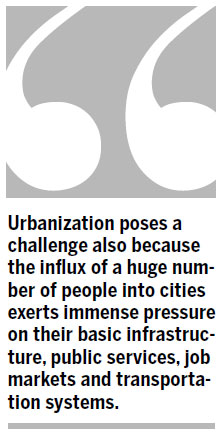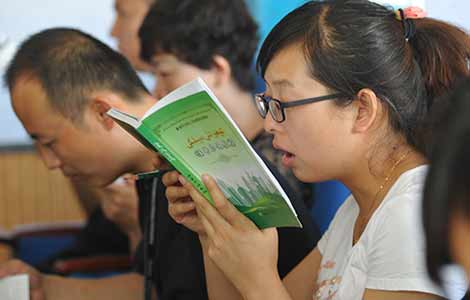The test of urbanization
Updated: 2013-08-10 08:31
By Xia Jiechang (China Daily)
|
|||||||||||

To deal with challenge posed by industrialization and expanding cities, China has to take steps to develop a green service sector
At his first news conference after assuming office, Premier Li Keqiang described China's urbanization as "unprecedented in human history". He was right. Over the past few decades, hundreds of millions of farmers have become urban residents, and more are likely to follow in the coming decades.
A growing population means a growing need for energy and natural resources. This problem is serious especially for China, because its energy efficiency level is low due to its overall mode of production. According to economist Gu Shengzu, China contributed 8 percent of the global economy in 2012 while it consumed 17.7 percent of the total energy generated by the world.
China is already suffering from "urban diseases" such as air pollution - an experience that all developed countries went through during their development period. Today, we live in a heavily polluted world. And the traditional economic development model, characterized by high energy consumption and unchecked exploitation of resources, is no longer sustainable.
Therefore, China has to find a sustainable urbanization model, a model that will help build a green economy. Like all other economies, the Chinese economy will need to rely more on the service sector during the later phase of industrialization to move toward an environmentally friendly mode of urbanization.
Urbanization poses a challenge also because the influx of a huge number of people into cities exerts immense pressure on their basic infrastructure, public services, job markets and transportation systems. The solution to the problem, hence, is to develop a green service sector, which, for example, would accommodate a greater number of people on smaller plots of land.
But what is a green service sector? Like industry and agriculture, the service sector too generates waste and, in the process, harms the environment. A green service sector, however, would not only generate less waste, but also reduce the consumption of resources and energy without compromising people's need for a better life. In short, a green service sector will help move the economy toward sustainable development.
But China's road to sustainable development is not without hurdles. According to a 2006 study by Wang Dehua of the Institute of Finance and Trade Economics, affiliated to the Chinese Academy of Social Sciences, China's service sector consumes more energy per unit of production than in most of the member countries of the Organization for Economic Cooperation and Development.
Besides, due to lack of a "green sense" many service enterprises pursue growth without efficiently using all the resources at their disposal. And the absence of a green evaluation system in the service sector prompts more enterprises to pursue profit at the cost of the environment.
What China needs to make its service sector green is, in fact, systemic reform. It could choose some key areas to introduce reform as a pilot and then extend it to the entire sector.
"Green finance", for example, could be part of the reform. Green finance requires financial departments to consider the potential environmental impact of their decisions to issue loans to businesses and entrepreneurs. China's financial institutions and regulating departments have a lot to do to guide economic resources toward green usage. They can start by establishing an eco-friendly legal system, following green evaluation methods to issue loans and setting up special agencies for green ratings.
Green logistics, too, could be part of the reform. Green logistics means maximum use, including recycling, of resources and reduction of pollution. The regulating department will have to set up special standards for logistics enterprises, and offer allowances and permits to enable green logistics companies to succeed in the market.
An energy-saving service industry, which provides eco-friendly technologies, services and products, and compels enterprises to follow green production and distribution methods has huge potential. But it will need more State support and regulation to enter the market.
Of course, while supporting these key industries, the State should also adopt related macro measures. Government agencies have to devise a long-term plan with environmental targets to facilitate the establishment of a green service sector. Detailed sub-plans are also needed for special industries like logistics and tourism.
The government as the regulator also needs to introduce more environmental protection authentication systems, like ISO14000 environmental management. It could offer more green-related services to enterprises, like promoting international exchange, making more systemic arrangements and championing green consumption. These measures will help more enterprises to establish green norms.
Moreover, the government should become green itself by initiating eco-friendly government purchases to support the country's fragile but growing green service sector. Only with State help, enterprises' participation and people's involvement can the green service sector become a reality.
The author is a researcher at the National Academy of Economic Strategy, Chinese Academy of Social Science. The Chinese version of this article was first published in China Development Observation magazine.
Related Stories
E-commerce growing in China's small towns 2013-08-07 16:45
Raining on cities' GDP parades 2013-08-07 09:20
103 locations earmarked for pilot smart cities 2013-08-06 16:49
New urbanites face challenges in enjoying rights 2013-07-31 11:20
China urbanization cost could top $106b a year 2013-07-31 10:06
Govt debt and urbanization 2013-07-31 09:49
Today's Top News
3 Chinese citizens killed, 2 missing in Afghanistan
Trade disputes hit solar export prices
New loans, social financing fall again
Industrial growth gaining momentum
Mandela manages to sit up
Arctic trade route opens
Rough road to continue for domestic carmakers
China's inflation rises 2.7% in July
Hot Topics
Lunar probe , China growth forecasts, Emission rules get tougher, China seen through 'colored lens', International board,
Editor's Picks

|

|

|

|

|

|





